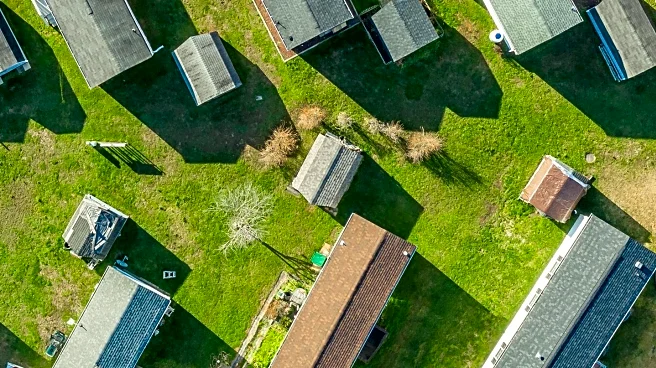What's Happening?
A 26-year-old woman, known as Daniel on TikTok, has gained significant attention after transforming a school bus into a mobile studio apartment to live rent-free. Documenting her three-year journey on TikTok, Daniel's video has garnered 21 million views. The project was motivated by her desire to avoid the financial burden of rent, which she witnessed her mother struggle with. The bus, purchased for $5,500, was converted into a 107-square-foot living space, complete with a bed, couch, toilet, and shower. Daniel undertook most of the renovation herself, with some assistance for complex tasks like plumbing and electricity. The total cost of the conversion was estimated between $25,000 and $35,000.
Why It's Important?
This story highlights the growing trend of alternative living solutions among younger generations facing high housing costs. With about half of U.S. renter households being cost-burdened, Daniel's approach offers a creative solution to the housing affordability crisis. Her project underscores the potential for self-sufficiency and financial independence, resonating with many who are similarly burdened by rent. The viral response to her TikTok video reflects a broader societal interest in sustainable and cost-effective living arrangements, particularly among Gen Z and millennials.
What's Next?
Daniel's success may inspire others to explore unconventional housing solutions, potentially influencing the housing market and urban planning. As more individuals seek affordable living options, there could be increased demand for resources and support for DIY home conversions. Additionally, this trend might prompt policymakers to consider new regulations or incentives for alternative housing solutions. Daniel herself plans to continue living in her converted bus, with aspirations to eventually purchase land and build a permanent home.
Beyond the Headlines
The ethical and environmental implications of Daniel's lifestyle choice are noteworthy. By living in a converted bus, she reduces her carbon footprint and promotes energy efficiency. This lifestyle also challenges traditional notions of homeownership and consumerism, encouraging a minimalist and sustainable approach to living. As housing costs continue to rise, such alternative living arrangements could become more mainstream, prompting a cultural shift towards valuing experiences and sustainability over material possessions.









